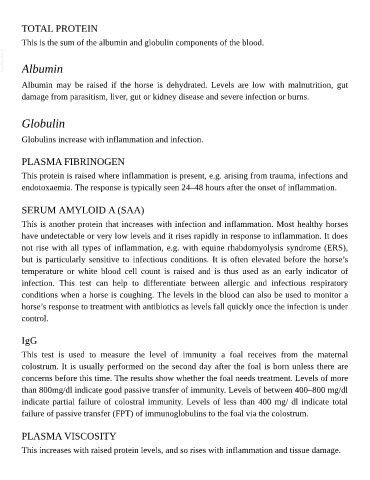Page 1077 - The Veterinary Care of the Horse
P. 1077
TOTAL PROTEIN
This is the sum of the albumin and globulin components of the blood.
VetBooks.ir Albumin
Albumin may be raised if the horse is dehydrated. Levels are low with malnutrition, gut
damage from parasitism, liver, gut or kidney disease and severe infection or burns.
Globulin
Globulins increase with inflammation and infection.
PLASMA FIBRINOGEN
This protein is raised where inflammation is present, e.g. arising from trauma, infections and
endotoxaemia. The response is typically seen 24–48 hours after the onset of inflammation.
SERUM AMYLOID A (SAA)
This is another protein that increases with infection and inflammation. Most healthy horses
have undetectable or very low levels and it rises rapidly in response to inflammation. It does
not rise with all types of inflammation, e.g. with equine rhabdomyolysis syndrome (ERS),
but is particularly sensitive to infectious conditions. It is often elevated before the horse’s
temperature or white blood cell count is raised and is thus used as an early indicator of
infection. This test can help to differentiate between allergic and infectious respiratory
conditions when a horse is coughing. The levels in the blood can also be used to monitor a
horse’s response to treatment with antibiotics as levels fall quickly once the infection is under
control.
IgG
This test is used to measure the level of immunity a foal receives from the maternal
colostrum. It is usually performed on the second day after the foal is born unless there are
concerns before this time. The results show whether the foal needs treatment. Levels of more
than 800mg/dl indicate good passive transfer of immunity. Levels of between 400–800 mg/dl
indicate partial failure of colostral immunity. Levels of less than 400 mg/ dl indicate total
failure of passive transfer (FPT) of immunoglobulins to the foal via the colostrum.
PLASMA VISCOSITY
This increases with raised protein levels, and so rises with inflammation and tissue damage.

